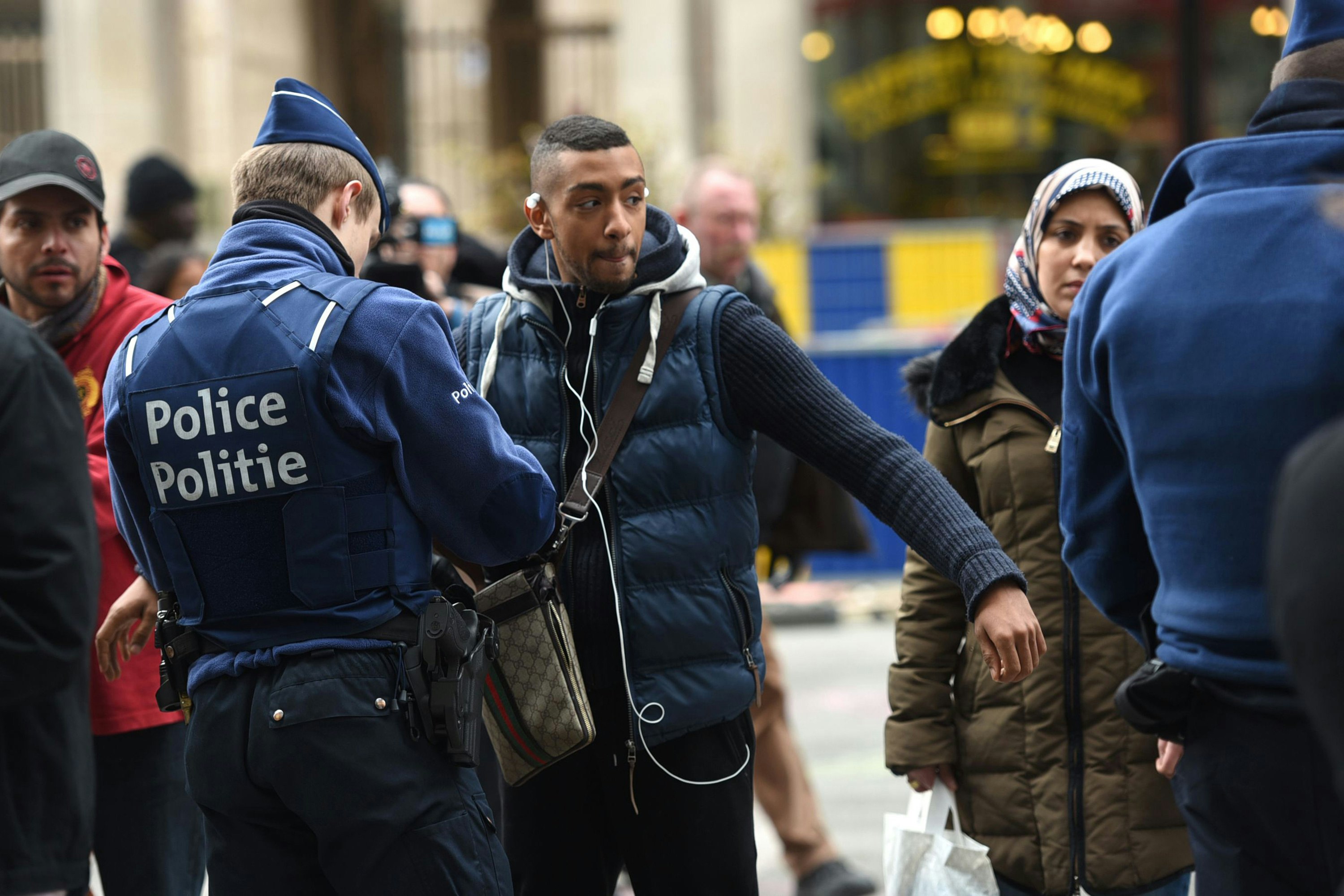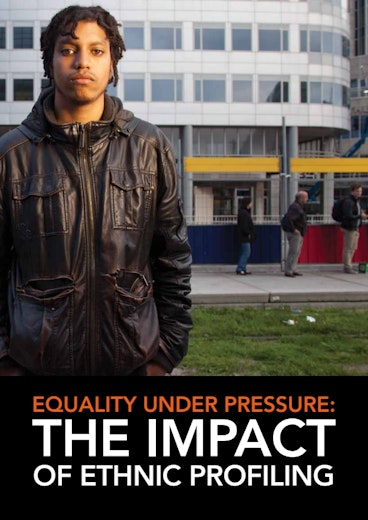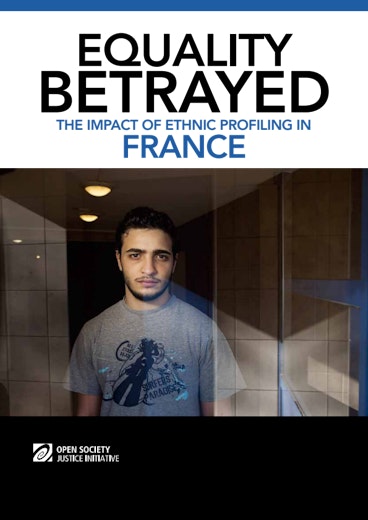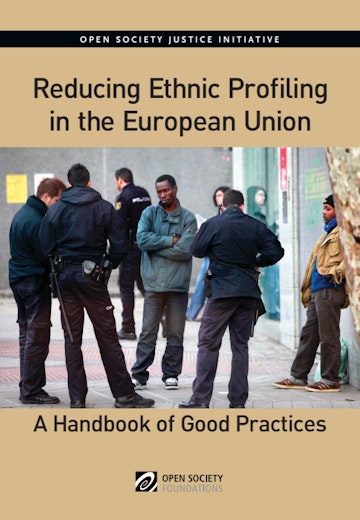Seydi and others v. France
Challenging Discrimination by Police
Young people from ethnic minorities in France have become used to being stopped by the police for identity checks and searches as part of their daily routine. The unequal focus on these groups is only possible because of the broad stop and search powers that are given to the police under the criminal procedure code, and the lack of documentation and supervision of those checks. Research over the years has demonstrated that these provisions allow too much scope for the police to stop people arbitrarily, allowing for discriminatory checks—ethnic profiling—which stigmatizes migrant and other visible minority communities, perpetuates stereotypes, and is an ineffective and counterproductive policing method.
Facts
Ethnic profiling is a pervasive problem in French policing. In 2009, in an effort to document this the Open Society Justice Initiative together with the Centre National de la Recherche Scientifique (National Centre for Scientific Research) published Profiling Minorities: A Study of Stop-and-Search Practices in Paris, which presented the results of an observational study of police stop-and-search operations in Paris and provided the first-ever quantitative data demonstrating the practice and scope of ethnic profiling.
The study documented over 500 police stops carried out from October 2007 to May 2008, across five locations in and around the Gare du Nord train station and Châtelet-Les Halles commuter rail station. The data showed that blacks were between 3.3 and 11.5 times more likely than whites to be stopped, while Arabs were between 1.8 and 14.8 times more likely to be stopped than whites. The study also found a strong relationship between people’s ethnicity, particular styles of clothing worn by young people, and the likelihood that they would be stopped.
A national survey published by the Human Rights Defender’s Office in January 2017 added striking new evidence demonstrating ongoing discriminatory practices. This nation-wide study surveyed 5,117 individuals by telephone between 19 February 2016 and 31 May 2016. The results indicated a significant concentration of identity checks on men perceived as Arab/North African and black. The survey found that men perceived as black experienced frequent checks (more than five times in the last five years) at a rate over six times more than men perceived as white. Men perceived as Arab experienced frequent checks 11 times more than men perceived as white. Taking age into account as well, the survey found that men between 18 – 25 years old perceived as black or Arab are 20 times more likely to be checked than the rest of the population.
French police do not release information about their stop and search practices, and France does not collect statistics on ethnicity that can show unequal treatment. So the problem has continued to be denied by successive French governments who therefore take no concrete steps to address it.
In recent years the problem of ethnic profiling has been formally recognised by high level officials. President François Hollande made an electoral commitment during the 2012 electoral race to “fight against ethnic profiling and abusive practices during identity checks through the establishment of a ‘procedure respectful of citizens’.”
Civil law claim
The first set of proceedings were started at the Tribunal de Grande Instance in Paris. The claimants are 13 young French men of North African or sub-Saharan origin who were stopped by police. They include students in business school, theatre school, accounting and high school; the aide to an elected official; a delivery man; and a high level football player. The checks all took place while the men were carrying out routine activities, such as walking in the street, sitting at a restaurant terrace, sitting on the steps outside their house, or chatting with friends in the city centre. None of the checks resulted in any legal action against the individuals, such as tickets or fines.
In each case the claimants provided at least one eyewitness statement describing the circumstances of each stop. They also presented evidence demonstrating a broad pattern and practice of discriminatory identity checks by French police, submitting reports issued by international and national monitoring bodies, academics, and NGOs.
The French authorities provided no material evidence to justify the individual stops during the proceedings, nor did they interview any police officers or carry out any investigation into the stops.
At first instance, the Tribunal de Grande Instance summarily dismissed all 13 cases.
Cour d’Appel
On appeal, the claimants argued that the checks were based on their presumed origin or skin colour and thus constituted discrimination.
On June 24, 2015, the Cour d’Appel found unlawful discrimination in five of the thirteen cases. The court noted that the absence of any record of identity checks meant that the victims were unable to obtain effective recourse. It was the proper role of the court to ensure that checks are based on objective grounds rather than on racial or ethnic grounds.
In 8 of the cases, the Cour d’Appel ruled that the applicants had failed to provide sufficient proof of discrimination. In a number of the cases the Cour d’Appel also accepted arguments by the French Minister of Interior that sought to justify stops on the basis that they were taking place in towns with high levels of delinquency or that relied on stereotypes.
The French State appealed the five decisions in favour of the claimants to the Cour de Cassation. The applicants also appealed the eight negative decisions.
Cour de Cassation
The French Cour de Cassation only considers points of law. The claimants argued that the Court of Appeal Court did not fully apply non-discrimination norms in the eight cases in which they lost.
On 9 November 2016 the Cour de Cassation ruled that non-discrimination law applies to these cases and that this implies a shifting of the burden of proof. The person checked needs to present evidence that creates a presumption of discrimination and the authorities then need to demonstrate that the check was based on objective grounds. The Court opined that the statistics and studies presented by the applicants demonstrated a pattern of frequent identity checks carried out against “visible minorities”. However, the judges concluded that this evidence was insufficient in itself to create a presumption of discrimination.
In the eight cases in which the Court of Appeal had ruled against the applicants, the Court of Cassation also noted that the witness statements did not demonstrate the different treatment. In a number of cases, the Court of Cassation also accepted as objective justifications for checks, explanations put forward by the authorities: a vague suspect description noting that two black men had committed a theft; wearing a hoody and walking briskly on a November day; a check in a neighbourhood considered to be particularly affected by crime. Six of the rejected applicants subsequently filed this application before the ECHR.
Open Society Justice Initiative Involvement
At national level the claimants in the civil law recourse were represented by Slim Benachour, member of the Syndicat des Avocats de France and Félix de Belloy from the Paris law-firm Beauquier, Belloy, Gauvain. At Court of Cassation level they were represented by the firm Lyon-Caen & Thiriez.
The Justice Initiative provided legal advice on relevant matters of European law and strategy development, and is working closely with a number of French nongovernmental organizations, community groups and lawyers to support the legal challenges.
Before the European Court of Human Rights, the applicants will be represented by lawyers Slim Benachour and Felix de Belloy, together with Justice Initiative lawyers Rupert Skilbeck, member of the London Bar, and James Goldston, member of the New York Bar.
Arguments
The application to the European Court of Human Rights argues that while formally recognizing the applicability of non-discrimination law, including a shifting of the burden of proof, the French Courts failed to apply these standards. The applicants were still required to prove the discriminatory nature of stops, rather than simply make out a prima facie case. The French Courts also failed to apply well established jurisprudence indicating that, where there is a structural problem with regard to discirmination the use of reliable statistics alone will be sufficient to establish a prima facie case. In addition, the French Courts accepted justifications for stops provided by French authorities that were not supported by evidence and relied on vague assertions and stereotypes about ethnic minorities .
The challenge also argues that the French authorities have failed in their positive obligation to implement legislation, procedures and practices that prvent discrimiation. The fact that individuals checked do not receive a stop form or other material evidence that they were stopped creates a climate of impunity in which police officers are free to discriminate without consequences.
Specifically, the application cites the following violations of the European Convention:
- Quality of Law. The legal basis for the identity checks carried out on the Applicants (Article 78-2) was not sufficiently precise to ensure that discrimination did not occur.
- Difference in Treatment. The applicants presented statistical evidence of a structural problem that French police stop racial minorities disproportionately. They also presented individual evidence that they were singled out for identity checks based on their skin colour, ethnic origin, or national origin, and other evidence in support.
- Burden of Proof. Having established a prima facie case of discrimination, it is for the State to demonstrate a non-discriminatory justification.
- No Justification. The police failed to provide any objective or reasonable justification for the stops.
- Proportionality. The State cannot justify such unlawful and arbitrary treatment by reference to vague formulations such as the need to combat crime, control immigration, or maintain public order. More effective and non-discriminatory policing methods must be introduced.
- Positive obligation. The French authorities have failed to put in place mechanisms and procedures to enable them to know whether there is a pattern of police discrimination, thus failing in their positive obligation to implement legislation, procedures, and practices that prevent discrimination. The fact that individuals checked do not receive a stop form or other material evidence that they were stopped creates a climate of impunity in which police officers are free to discriminate without consequences.
The applicants are also asking the Court to oblige France to take steps to address these practices and ensure that other victims have an effective recourse.
The Court transmits the government’s final observations to the Justice Initiative after which no additional pleadings can be filed.
The Court informs the Justice Initiative that is has granted an extension of the time-limit for the government’s additional observations until June 13, 2022.
The Court informs the Justice initiative that it has invited the government to submit observations on the request for just satisfaction, and any other issue, by May 19, 2022.
The Justice Initiative and co-counsel submit observations in reply to the government’s observations, with legal support from the law firm Antoine Lyon-Caen and the Equality Law Clinic of the University of Brussels, making a request for just satisfaction and general measures pursuant to Article 41 and Article 46 of the ECHR. The brief is accompanied by a statement of facts.
The Court notifies the Justice Initiative that the French government has refused a friendly settlement and transmits the government’s observations on the admissibility and the merits of the case.
The European Court of Human Rights informs the Justice Initiative that it has granted an extension of the initial time-limit for the government’s observations until March 2, 2022.
The European Court of Human Rights considers that the case can possibly fall under the category of an “impact case” (“affaire à impact”), which would expedite its processing, and gives a deadline of February 2, 2022, for the French government to submit facts and observations on questions posed by the Court, as well as its position regarding an amicable settlement of the case.
The applicants file an application before the European Court of Human Rights.
The Cour de Cassation issues judgments on the case.
The Paris Cour de Cassation holds a public hearing of arguments.
The Cour d’Appel releases judgements that partially uphold the appeals.
Public hearing of arguments at the Paris Cour d’Appel.
France's human rights ombudsman, the Defenseur des Droits, files an intervention in the case, supporting the court's right to review the relevant police procedures, and citing the primacy of European human rights law in discrimination.
The court rejects the applications, which is appealed by the claimants.
Oral hearings take place at the Tribunal de Grande Instance de Paris.
Thirteen individuals file claims before the Tribunal de Grande Instance de Paris.
Related Cases
Zeshan Muhammad v. Spain
Ethnic profiling by law enforcement officers continues to be a persistent and pervasive practice throughout Spain, particularly in the context of immigration control.
Williams v. Spain
With Women’s Link Worldwide and SOS-Racismo Madrid, the Open Society Justice Initiative filed a complaint to the United Nations Human Rights Committee on behalf of Rosalind Williams regarding a case of racial profiling by a Spanish police officer.
Related Work
Data Alone Won’t Stop Ethnic Profiling
While many police officers in Belgium recognize that ethnic profiling is real and harmful, acknowledging the problem is only the beginning. It’s time for law enforcement to move beyond words and make concrete policy changes.

Equality Under Pressure: The Impact of Ethnic Profiling in the Netherlands
The Dutch pride themselves on being members of an open, tolerant, and fair society. But for a growing number of people in the Netherlands, this ideal is being put under pressure by proactive police actions.

Equality Betrayed: The Impact of Ethnic Profiling in France
French police checks disproportionately target young men of North African and Arab origin: read first hand accounts of the human cost and the damage done.

Reducing Ethnic Profiling in the European Union: A Handbook of Good Practices
The nearly 100 case studies gathered in this handbook show that efforts to address ethnic profiling can reduce discrimination, and enhance the overall quality and efficiency of law enforcement.
